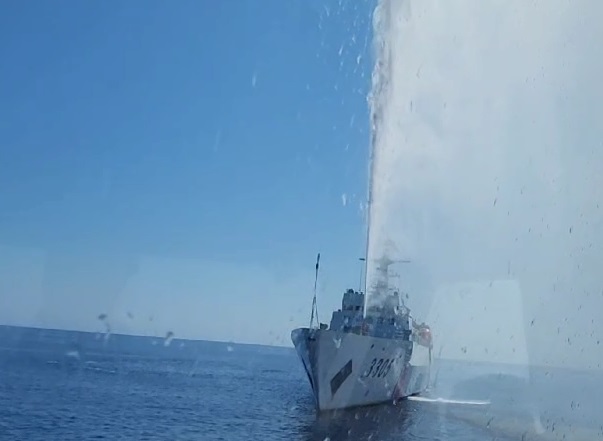China's firing of water cannon at PH vessels 'endangered lives' —US, Japan

The United States and Japan expressed concern on Saturday over China's firing of water cannon at Philippine vessels conducting routine resupply missions in the Scarborough Shoal.
"We condemn PRC's (People's Republic of China) aggressive, illegal actions against Philippine BFAR vessels lawfully operating in the Philippine EEZ (exclusive economic zone)," said US Ambassador MaryKay Carlson in a statement on X.
"This PRC behavior violates international law and endangers lives and livelihoods. We stand with our Philippine #FriendsPartnersAllies in support of a #FreeAndOpenIndoPacific," Carlson added.
The US, a longtime Philippine treaty ally, has repeatedly reaffirmed Washington’s commitment to stand by the Philippines against aggression and warned China that an attack on the Philippine military in the South China Sea would trigger their mutual defense treaty (MDT).
The MDT, a 1951 defense pact signed between Manila and Washington, binds the two allies to come to each other’s aid from aggression and help defend the other party.
Washington said it is within its national interest to maintain unfettered access to the South China Sea’s strategic sealanes and airspace.
Japanese Ambassador Koshikawa Kazuhiko, meanwhile, said he is "seriously concerned" by the dangerous actions by Chinese Coast Guard vessels against the Philippines' Bureau of Fisheries and Aquatic Resources (BFAR) vessel that was on a mission to distribute oil and other supplies to fisherfolk in the Scarborough Shoal.
China's action, Kazuhiko said, "endangers lives and livelihoods and poses a threat to peace and stability in the South China Sea."
"We reiterate the importance of upholding international law, particularly UNCLOS and the 2016 Arbitral Award," the Japanese envoy said.
The shoal, a U-shaped rocky outcrop teeming with marine resources, was seized by China from Manila in 2012 following a two-month standoff, triggering an arbitration complaint by Manila 10 years ago.
China, which claims the South China Sea nearly in its entirety, does not recognize the ruling.
An arbitral tribunal in The Hague, Netherlands, invalidated China’s sweeping claims over the South China Sea in 2016 but ruled that Scarborough Shoal is a traditional fishing ground for Filipino, Vietnamese, and Chinese fishermen.
It also ruled that Beijing violated the rights of Filipinos, who were blocked by the Chinese Coast Guard from fishing in the disputed Scarborough Shoal off northwestern Philippines.
Manila maintains it has sovereignty over the shoal, locally called Bajo de Masinloc, saying "it forms an integral part of the Philippine national territory under the Constitution."
"The Philippines exercises sovereignty and jurisdiction over the shoal and its territorial sea," the Department of Foreign Affairs said.
Scarborough is 472 nautical miles from China’s nearest coastal province of Hainan and lies 124 nautical miles off the nearest Philippine landmass of Palawan.
The Chinese Embassy in Manila, meanwhile, insisted that China had "indisputable sovereignty over Nanhai Zhudao, consisting of Dongsha Qundao, Xisha Qundao, Zhongsha Qundao and Nansha Qundao, and their adjacent waters, and had sovereign rights and jurisdiction over relevant waters.
"For some time, the Philippines has been sending people to Tiexian Jiao and other uninhabited islands and reefs of China’s Nansha Islands and sending aircraft and vessels to intrude into adjacent waters and airspace of China’s Nansha Islands and Huangyan Dao," the embassy said in it's Saturday statement. —VAL, GMA Integrated News




